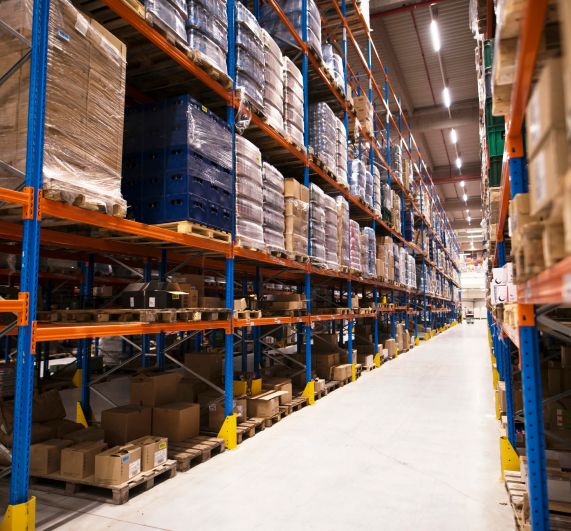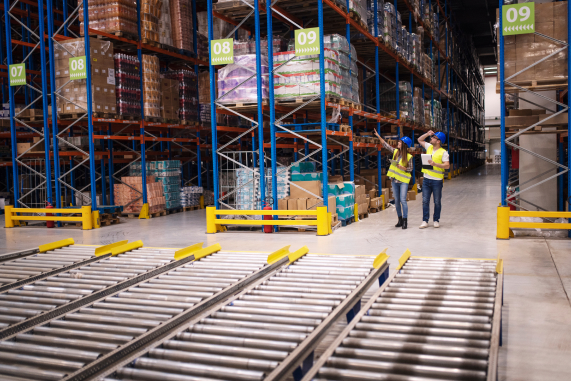Logistic Activity
It is a project that provides logistical services to investors under a license to practice an activity issued by the Suez Canal Economic Zone Authority , And it includes four categories:
Logistics services in Public Customs Warehouses, Private Customs Warehouses, Investment Logistics Areas, and Temporary Customs Warehouses inside the Port only.
Public and Private Customs Warehouses
They are warehouses for which a shared license is issued by the SCZone Authority and the Customs Authority. They are designated for depositing goods under the supervision of a customs committee, whether it is private or public warehouses as categorized by virtue of the Customs Law. The project is obligated to pay the due guarantees and royalties arising from the loss or damage of the goods stored in the site. Surety can be re-evaluated by the SCZone Authority at any time, taking into account changes in the operational or legal aspect in accordance with the provisions of the Customs Law and executive regulations thereof:
Period of storage is one year, and it may be extended for another period not exceeding one year by a decision of the Board of Directors of the SCZone Authority or its delegate,
Purposes are storage, packing, packaging, coding, retailing, re-exporting shipments, or shipping abroad, as well as holding and organizing exhibitions. Warehouses must meet the quality control requirements.

Investment logistics areas
- Areas are established to invest in the fields of logistics services or trade development to provide integrated services providing storage and other complementary activities to ensure the safety and arrival of products to the consumer with high quality or redistribute them outside the country to develop international trade, as regional redistribution centers (HUBS).
- These areas are closed warehouses, open and equipped storage yards, and cold (freezing) stores, for the purpose of receiving general finished goods, on which maintenance activities, sorting, packaging, and other complementary logistical activities are carried out. This is to prepare or rehabilitate such goods, or carry out any additional operations on them without resulting in a change in their tariff categories when these goods are released into the country.
- Such areas are licensed to practice their activities by a decision issued by the SCZone Authority, in addition to a customs department decision that is issued by a decision of the Minister of Finance or their authorized representative. The SCZone Authority collects an amount of fifty thousand Egyptian pounds annually from the project in favor of the Customs Authority for observing the following:
The Duration of Goods Stay in the Licensed Logistics Areas: It is two years, and the SCZone Authority may extend it for justifiable reasons, in a manner that does not conflict with the goods validity duration according to the nature of the item.
- The investor of the logistics area shall submit an acceptable customs surety to cover all due taxes and fees arising from the loss or damage of the goods stored at the site throughout the validity period of the issued license. The financial guarantee usually represents (15%) of the maximum taxes determined for the goods.
- The different purposes of logistics zones are:
- Logistics areas for courier services for e-commerce companies as a station for them to carry out packing, warehousing, and coding of purchased packages, as well as for international courier companies and airlines.
- Logistics areas specialized in storing and equipping vehicles for people with special needs Importing vehicles is done by the project owner to be re-exported outside the country or entered to the local market by personal import (in the name of the handicapped person).
- Logistics areas for Ro-Ro berths outside the port or storage areas for trading companies in transit cars to take advantage of the Ro-Ro berths in the ports of the Zone and their developed capabilities, provided that these berths become just a means of transit and not storage yards inside the port.
- Specialized logistics areas for global and international shipping line companies to carry out their transit operations and all transport and packaging works. Connection with their sites is done through network terminals to be able to reserve spaces and rent equipment, if necessary, and get comprehensive services for it and for people on the vessel by providing all support and amenities such as booking hotels, meeting rooms and internal transportation means in the governorates.
Temporary Customs Warehouses inside the port
The SCZone Authority may request a license for temporarily storing goods in temporary customs warehouses inside its ports from the Customs Authority. This is done in accordance with the provisions of the Customs Law and executive regulations thereof, without prejudice to the provisions of the Economic Zones of a Special Nature law.

Basic Frameworks for the Operational Model of Logistics Projects
Foreign goods that have not been cleared of customs tax shall be transported to warehouses established in the zone under the transit system and in accordance with the financial guarantees provided in the Customs Law only, which shall be submitted solely for the benefit of the Customs Authority.
The board of directors of the SCZone Authority may, in accordance with what is necessary for the public interest of the country, allow warehouses specializing in storing one item, machine spare parts, production lines, equipment, electronic or electrical devices, or raw materials, to extend the storage period for other durations. It is also permissible, when releasing the goods deposited therein, to split the single bill of lading into an unspecified number throughout the authorized storage period, provided that the shared licensing decision issued for the warehouse stipulates these procedural advantages and the decision number of the Board of Directors its delegates in this regard.
Public and private customs warehouses or investment logistics areas may receive goods from the local market for the purpose of exporting them abroad in their original condition or after going through complementary operations, pursuant to the first paragraph of Article (23) of the law. It is prohibited to store them in the project for a period exceeding three months, provided that the storage ends with export outside the country; otherwise it is considered a customs violation by the person concerned, taking into account that all requirements for export abroad are fulfilled.
Modern technologies are used to record the entry and exit of goods, vehicles, individuals, and containers from the storage areas under the supervision and follow-up of the competent customs department. All documents are checked and reviewed, and communication with companies is achieved through a unified system.
In case one project has a license to practice various storage activities within its coordinates (for the benefit of third parties/for oneself/tax-free/outstanding taxes), each activity must be separated from the other by fences, walls, and separate entry and exit gates.
The six ports attached to the SCZone provide full support in the field of logistics services, in order to achieve significant savings in the container transport industry and reduce the cost of journeys when berthing for container transport vessels.
Specialized thermal areas and others are provided for all storage purposes, such as storing foodstuffs or raw materials, etc., provided that companies investing in this field shall publish their services’ prices, types, and capabilities on the SCZone Trade portal.
Relevant Important References and Resources
- First Paragraph of Article 23 of Economic Zones of a Special Nature Law

